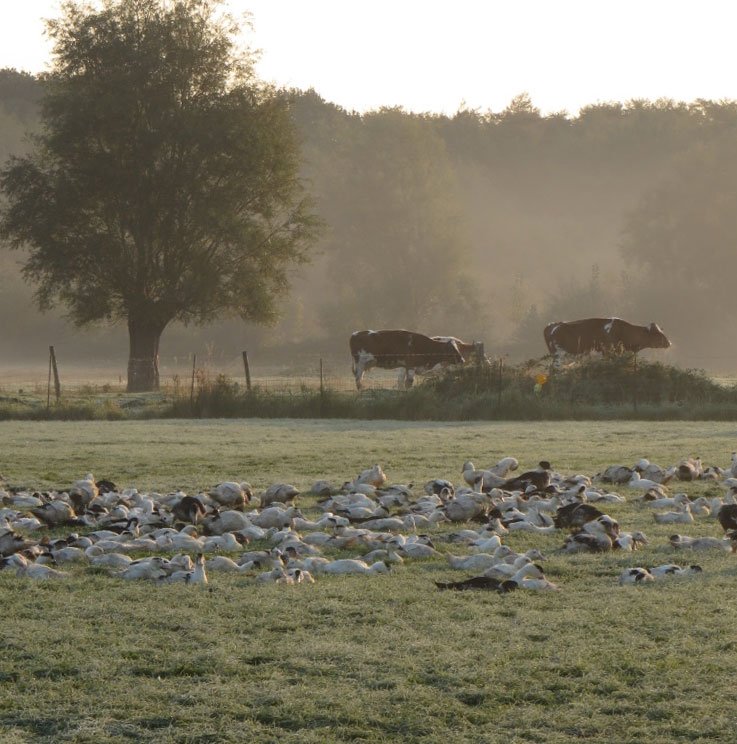Ban of assisted-feeding in Flanders

The European Foie Gras Federation – Euro Foie Gras – would like to express its deep indignation regarding the adoption by the Flemish Parliament (Belgium) on Wednesday 13 March 2019 of a decree banning fattening in the production of foie gras.
Euro Foie Gras denounces a vote based on a lack of knowledge on the production process and prejudices, in particular those generated by erroneous ideas and images deliberately disseminated by animal activists.
Belgium is a foie gras producing country with farms spread all over the country. Belgians, 2nd largest consumers of foie gras in Europe after France with 90 grams per inhabitant per year, appreciate this quality dish. Many Belgian chefs work on this exceptional product, which is part of the gastronomic heritage in France and Hungary.
Why did elected officials want to deprive their fellow citizens of the choice of being able to consume a local and high-quality product when foie gras comes from traditional know-how practiced with control and respect for animal welfare? Euro Foie Gras would like to remind you that ducks live 90% of their lives outdoors before the fattening phase, which lasts between 10 and 14 days, with two meals a day. The fattening phase is only possible because foie gras palmipeds have the natural ability to store fat in order to be able to carry out long migratory journeys. The meal is only administered after checking that the animal has digested its previous meal.
“It is absolutely scandalous that public money is used to stop a perfectly legal activity! And this only in order to serve political ambitions, as this strangely ideal timing shows! [Next regional elections will take place in May 2019 in Belgium and animal welfare is a regional competence ed.] “said Christophe Barrailh, President of Euro Foie Gras.
The idea that foie gras production is contrary to animal welfare is also totally unfounded. The compatibility of assisted feeding with the welfare of palmipeds is demonstrated by a series of independent studies[1], constantly ignored by those who misinform the general public by leading them into an anthropomorphic perception of the animal, whereas the latter, although sentient, remains nevertheless different from human beings because of its particular anatomical characteristics: absence of glottis and elastic oesophagus which can stretch without any suffering. Belgian producers set an example in terms of animal welfare, their good practices being certified by public services. They therefore do not understand this persecution of their production when their animals enjoy a level of welfare that meets the most demanding criteria in the world.
Euro Foie Gras would like to express its full support for Filip Callemeyn, the only producer of foie gras palmipeds in Flanders, and strongly denounces this decision, which will deprive him and his wife of an activity in which they have invested their time and passion for over 20 years. In love with his profession and proud of his farm, Filip organizes several times a year visits and festive events to introduce the general public to the reality of his work. Unfortunately, his seriousness and rigorous deontology did not protect him from defamatory attacks from associations quicker to take media action than to study the reality on the ground, or from pre-election demagogic initiatives.
While reiterating its indignation at the recent Flemish decree, Euro Foie Gras will continue to provide transparent and accurate information on how foie gras is produced and will also continue to promote the profession of foie gras producer in Belgium and throughout Europe.
[1]
Among which:
– Z Erisir & al. 2009, “Effect of different housing systems on growth and welfare of Pekin ducks”, Journal of Animal and Veterinary Advances 8(2).
– MS Dawkins, 2012, “Commercial scale research and assessment of poultry welfare”, British Poultry Science
– E Baéza & collab., 2005, “Canards de Barbarie, Pékin et leurs hybrides: aptitude à l’engraissement », INRA Productions
– P. Chartrin & collab.,2004, « Effet du génotype et du gavage sur les dépôts de lipides intramusculaires dans le filet de canard », Viandes et Produits Carnés, Hors-série des 10e Journées des Sciences du Muscle et Technologies des Viandes »
